雅思剑桥系列3-8高分范文整理
【第3期】雅思大作文8分范文中英对照及关键句型
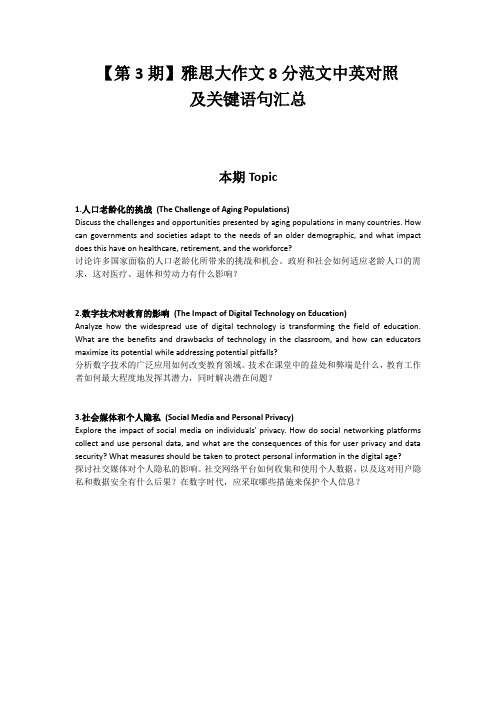
【第3期】雅思大作文8分范文中英对照及关键语句汇总本期Topic1.人口老龄化的挑战(The Challenge of Aging Populations)Discuss the challenges and opportunities presented by aging populations in many countries. How can governments and societies adapt to the needs of an older demographic, and what impact does this have on healthcare, retirement, and the workforce?讨论许多国家面临的人口老龄化所带来的挑战和机会。
政府和社会如何适应老龄人口的需求,这对医疗、退休和劳动力有什么影响?2.数字技术对教育的影响(The Impact of Digital Technology on Education)Analyze how the widespread use of digital technology is transforming the field of education. What are the benefits and drawbacks of technology in the classroom, and how can educators maximize its potential while addressing potential pitfalls?分析数字技术的广泛应用如何改变教育领域。
技术在课堂中的益处和弊端是什么,教育工作者如何最大程度地发挥其潜力,同时解决潜在问题?3.社会媒体和个人隐私(Social Media and Personal Privacy)Explore the impact of social media on individuals' privacy. How do social networking platforms collect and use personal data, and what are the consequences of this for user privacy and data security? What measures should be taken to protect personal information in the digital age?探讨社交媒体对个人隐私的影响。
雅思8分作文范文
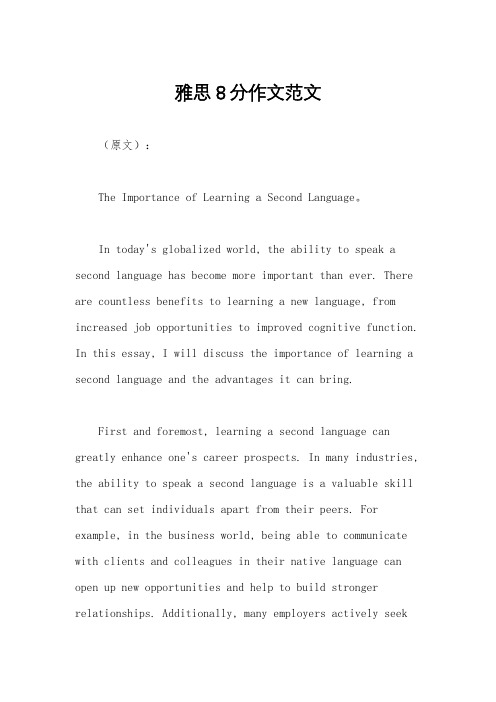
雅思8分作文范文(原文):The Importance of Learning a Second Language。
In today's globalized world, the ability to speak a second language has become more important than ever. There are countless benefits to learning a new language, from increased job opportunities to improved cognitive function. In this essay, I will discuss the importance of learning a second language and the advantages it can bring.First and foremost, learning a second language can greatly enhance one's career prospects. In many industries, the ability to speak a second language is a valuable skill that can set individuals apart from their peers. For example, in the business world, being able to communicate with clients and colleagues in their native language can open up new opportunities and help to build stronger relationships. Additionally, many employers actively seekout bilingual candidates, as they can help to bridge the gap between different cultures and markets.Furthermore, learning a second language can also have a positive impact on one's cognitive function. Studies have shown that bilingual individuals have better problem-solving skills, improved memory, and a greater ability to multitask. This is because learning a new language requires the brain to work in different ways, which can help to strengthen neural pathways and improve overall brain function. In fact, research has suggested that being bilingual can even delay the onset of dementia and Alzheimer's disease in later life.In addition to the practical and cognitive benefits, learning a second language can also provide individuals with a greater understanding and appreciation of other cultures. Language is closely tied to a society's history, customs, and values, and by learning a new language, individuals can gain a deeper insight into the traditions and beliefs of different communities. This can help to foster greater empathy and understanding, and canultimately lead to more harmonious relationships between people from different backgrounds.In conclusion, the ability to speak a second languageis an incredibly valuable skill that can bring a wide range of benefits. From increased job opportunities to improved cognitive function and a greater understanding of other cultures, there are countless advantages to learning a new language. Therefore, I believe that it is essential for individuals to make an effort to learn a second language,as it can open up new opportunities and enrich their livesin countless ways.(仿写):The Significance of Acquiring a Second Language。
雅思范文及赏析-剑8Test03-大作文

剑8Test3大作文Increasing the price of petrol is the best way to solve growing traffic and pollution problems.To what extent do you agree or disagree?What other measures do your think might be effective?1.话题和题型分类政府类;混合类2.题目分析增长汽油价格的利弊;解决交通问题的方法3.思路提示A.增长汽油价格的弊端:交通问题的引发具有多方面的因素不合理的道路规划和红绿灯设置新司机数量多,引发交通事故公交价格随之上涨B.其他解决方法:鼓励人们使用清洁燃料优化公交系统设置发展地下铁路系统Sample AnswerI disagree with the idea that increasing petrol prices is the best way to deal with traffic and pollution because it may increase the cost of anything that is related to petrol.In addition,there are some better ways to solve growing traffic and pollution problems.内容详细条目段落此段结构1直接表达观点此段功能首段开篇摆明观点:不同意提高汽油价格是解决交通和污染问题的最好方法。
First of all,if petrol prices are increased,it will most likely lead to less petrol being used,which will make environmentalists happy.Of course,there will be less traffic and there will be less pollution,but I do not think that the advantages of this outweigh the disadvantages. The falling price will increase the cost of anything that uses petrol in its production or in transport;in other words,everything from plastic bags to computers will become more expensive.This is likely to lead to slower economic growth as less is bought and produced.内容详细条目段落此段结构1论据一:汽油价格上升会导致相关产品的价格上涨。
2019年雅思阅读8分经验精读剑桥雅思-优秀word范文 (1页)

2019年雅思阅读8分经验精读剑桥雅思-优秀word范文本文部分内容来自网络整理,本司不为其真实性负责,如有异议或侵权请及时联系,本司将立即删除!== 本文为word格式,下载后可方便编辑和修改! ==雅思阅读8分经验精读剑桥雅思下面雅思为大家整理了雅思阅读8分经验:精读剑桥雅思,供考生们参考,以下是详细内容。
我于10号在北京第二次参加了雅思考试,成绩如下:听6.5 说6 读8 写5 总分6.5。
而第一次的成绩是:听7 说6 读6 写5 总分6;考试时间是1月6号。
其实这个分数不是很高,特别是写作,两次考试都是5分,还需要好好锤炼.但是各位雅友一定知道,6.5分,尤其是对出国读本科的同学来说是一个重要的分界线,基本上这个分数除了在少数,如 OXFORD 和 CAMBRIDGE 这种牛校受限制外,选择的空间是非常大的.因此,我的一些经验和教训,虽然不适合一些想要拿7分或8分这种高分的同学,但对广大持续徘徊在5.5到6分的战友而言,相信还是有一些参考价值的.以下就是我在第一次考试后对自己的分析,希望可以对大家有所帮助:首先要思考自己在听说读写四项中最擅长哪项?最不擅长哪项?兵法有云:夫未战而庙算胜者,得算多也,未战而庙算不胜者,得算少也,多算胜,少算不胜,而况于无算?因此这一步不论是第一次考的同学还是有过考试经历的同学都应该做,也必须要做的.本人是通过阶段性的学习和第一次考试知道自己长于听力而短于写作和阅读.而后再作进一步分析,哪项提高的空间更大?如听力和写作就是需要长时间提高的项目,但同时,想要使水平有所下滑,也是非常不容易;反之,阅读和口语对于我来说则有快速突破的空间.因此,我采取的方案是听力和写作做阶段性训练,每周做一定量的题,以保持和缓慢提高原本的水平;对于阅读则采取泛读和精读并行的策略。
雅思17test3大作文8分范文
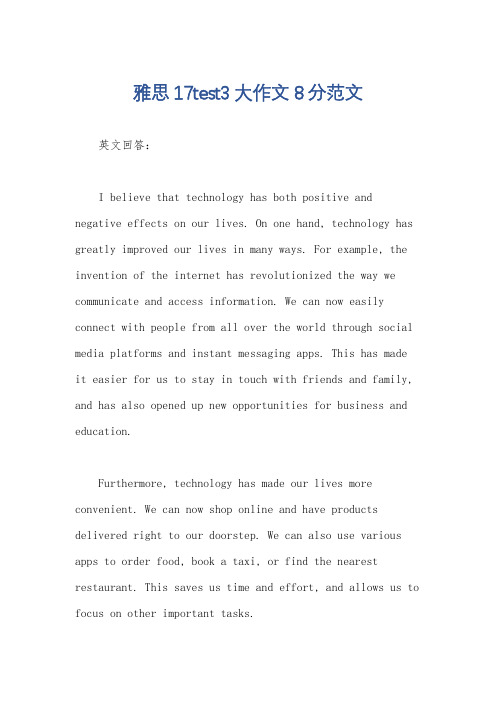
雅思17test3大作文8分范文英文回答:I believe that technology has both positive and negative effects on our lives. On one hand, technology has greatly improved our lives in many ways. For example, the invention of the internet has revolutionized the way we communicate and access information. We can now easily connect with people from all over the world through social media platforms and instant messaging apps. This has madeit easier for us to stay in touch with friends and family, and has also opened up new opportunities for business and education.Furthermore, technology has made our lives more convenient. We can now shop online and have products delivered right to our doorstep. We can also use various apps to order food, book a taxi, or find the nearest restaurant. This saves us time and effort, and allows us to focus on other important tasks.However, technology also has its drawbacks. One of the biggest concerns is the impact it has on our mental and physical health. Many people spend excessive amounts oftime on their phones or computers, which can lead to issues such as eye strain, sleep deprivation, and social isolation. Moreover, the constant exposure to social media can have a negative effect on our self-esteem and mental well-being.It is important to find a balance and use technology in moderation.中文回答:在我看来,科技对我们的生活既有积极的影响,也有消极的影响。
剑桥英语3雅思考官范文(大作文+小作文)
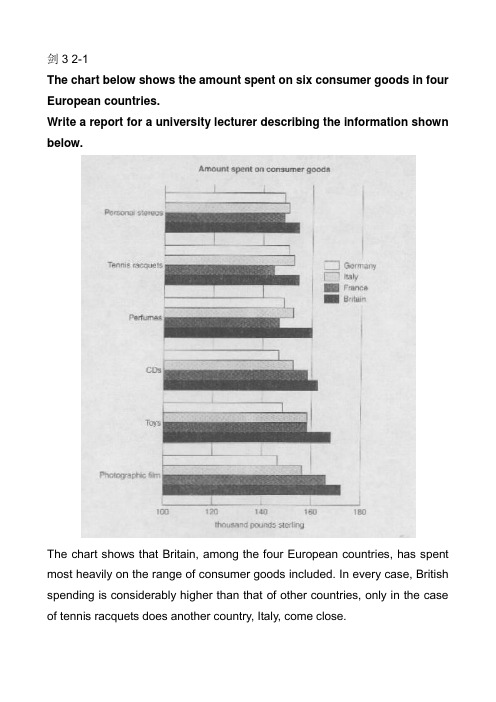
剑3 2-1The chart below shows the amount spent on six consumer goods in four European countries.Write a report for a university lecturer describing the information shown below.The chart shows that Britain, among the four European countries, has spent most heavily on the range of consumer goods included. In every case, British spending is considerably higher than that of other countries, only in the case of tennis racquets does another country, Italy, come close.In contrast, Germany is generally the lowest spender. This is most evident in photographic film, where Germany spends much less than Britain. Germany only spends more than another country, France, in two cases: tennis racquets and perfume.Meanwhile, France and Italy generally maintain middle positions, averaging approximately similar spending overall. Specifically, France spends more on CDs and photographic film but less on tennis racquets than Italy does. Italy’s spending on personal stereos is only marginally than that of France, while spending on toys is equal between the two.It is clear from the data give that there are some significant differences in spending habits within Europe.剑3 2-2When a country develop its technology, the traditional skills and ways of life die out. It is pointless to try and keep them alive.To what extent do you agree or disagree with this opinion?Overall, I disagree with the opinion expressed. I would like to begin by pointing out that traditional skills and ways of life are not automatically of one country, but of a culture or community..In many ways, the history of civilisation is the history of technology:from the discovery of fire to the invention of the wheel to the development of the Internet, we have been moving on from previous ways of doing things. Some technologies, such as weapons of mass destruction, are of negative impact. Others, such as medical advances, positively help people to live better or longer, and so very much help traditional way of life. Surely, few people wouldseek to preserve such traditions as living in caves!Interestingly, technology can positively contribute to the keeping alive of traditional skills and ways of life. For example, the populations of some islands are too small to have normal schools. Rather than breaking up families by sending children to the mainland, education authorities have been able to use the Internet to deliver schooling online. In addition, the Internet, and modern refrigeration techniques, are being used to keep alive the traditional skills of producing salmon; it can now be ordered from, and delivered to, anywhere in the world.In conclusion, without suggesting that all technology is necessarily good, I think it is by no means ‘pointless’, In any way , to keep traditions alive with technology. We should not ignore technology, because it can be our friend and support our way of life.剑3 3-1The charts below show the levels of participation in education and science in developing and industrialised countries in 1980 and 1990. Write a report for a university lecturer describing the information shown below.The data shows the differences between developing and industrialised countries participation in education and science.In terms of the number of years of schooling received, we see that length oftime people spend at school at school in industrialised countries was much greater at 8.5 years in 1980, compared to 2.5 years in developing countries. The gap was increased further in 1990 when the figures rose to 10.5 years and 3.5 years respectively.We can see a similar pattern in the second graph, which shows that the number of people working as scientists and technicians in industriallsed countries increased from 55 to 85 per1000 people between 1980 and 1990, while the number in developing countries went from 12 to 20.Finally, the figures for spending on research and development show that industrialised countries more than doubled their spending, from $200bn to $400bn, whereas developing countries actually decreased theirs, from $75bn down to $25bn.Overall we can see that not only are there very large differences between the two economies but that these gaps are widening.剑3 3-2In many countries children are engaged is some kind of paid work. Some people regard this as completely wrong, while others consider it as valuable work experience, important for learning and taking responsibility.The issue of children doing paid work is a complex and sensitive one. It is difficult to say who has the right to judge whether children working is ‘wrong’ or ‘valuable’. Opinions will also differ as to ‘learning’ benefits: no doubt teachers and factory owners, for example, would have varying concerns.An important consideration is the kind of work undertaken. Young childrendoing arduous and repetitive tasks on a factory production line, for example, are less likely to be ‘learning’ than older children helping in an old people’s home. There are health and safety issues to be considered as well. It is an unfortunate fact that many employers may prefer to use the services of children simply to save money by paying them less than adults and it is this type of exploitation that should be discouraged.However, in many countries children work because their families need the additional income, no matter how small. This was certainly they case in the past in many industrialized countries, and it is very difficult to judge that it is wrong for children today to contribute to the family income in this way.Nevertheless, in better economic circumstances, few parents would choose to send their children out to full-time paid work. If learning responsibilities and work experience are considered to be important, then children can acquire these by having light, part-time jobs or even doing tasks such as helping their parents around the family home, which are unpaid, but undoubtedly of value in children’s development.。
剑桥英语8雅思考官范文(大作文+小作文)
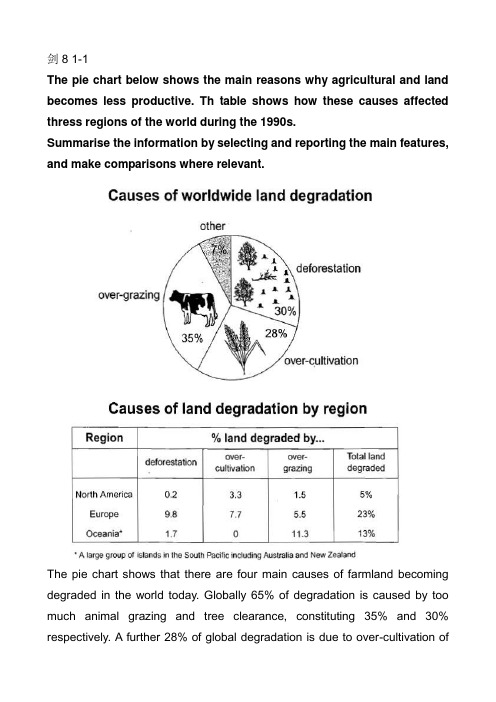
剑8 1-1The pie chart below shows the main reasons why agricultural and land becomes less productive. Th table shows how these causes affected thress regions of the world during the 1990s.Summarise the information by selecting and reporting the main features, and make comparisons where relevant.The pie chart shows that there are four main causes of farmland becoming degraded in the world today. Globally 65% of degradation is caused by too much animal grazing and tree clearance, constituting 35% and 30% respectively. A further 28% of global degradation is due to over-cultivation ofcrops. Other causes account for only 7% collectively.These causes affected different regions differently in the 1990s, with Europe having as much as 9.8% of degradation due to deforestation, while the impact of this on Oceania and North America was minimal, with only 1.7% and 2% of land affected respectively. Europe with the highest overall percentage of land degraded(23%),also suffered from over-cultivation(7.7%) and over-grazing(5.5%). In contrast, Oceania had 13% of degraded farmland and this was mainly due to over-grazing(11.3%). North America had a lower proportion of degraded land at only 5%, and the main causes of this were over-cultivation(3.3%) and , to lesser extent,over-grazing(1.5%).Overall, it is clear that Europe suffered more from farmland degradation than the other regions, and the main causes there were deforestation and over-cultivation.剑8 1-2Some people think that parents should teach children how to be good members of society. Other, however, believe that school is the place to learn this.Discuss both these views and given your own opinion.A child’s education has never been about learning information and basic skills only. It has always included teaching the next generation how to be good members of society. Therefore , this cannot be the responsibility of the parents alone.In order to be a good member of any society the individual must respect and obey the rules of their community and share their values. Educating children tounderstand the need to be obey rules and respects others always begins in the home and is widely though to be the responsibility of parents. They will certainly be the first to help children learn what is important in life, how, they are expected to behave and what role they will play in their world.However learning to understand and share the value system of a whole society cannot be achieved just in the home. Once a child goes to school,they are entering a wider community where teachers and peers will have just as much influence as their parents do at home. At school,children will experience working and living with people from a whole variety of background from the wider society. This experience should teach them how to co-operate with each other and how to contribute to the life of their community.But to be a valuable member of any community is not like learning a simple skill. It is something that an individual goes on learning throughout life and it is the responsibility of every member of a society to take responsibility for helping the younger generation to become active and able members of that society.剑8 2-1The three pie charts below show the changes in annual spending by a particular UK school in 1981,1991 and 2001.Summarise the information by selecting and reporting the main features, and make comparisons where relevant.The charts show how much a UK school spent on different running costs in three separate years 1981,1991 and 2001.In all three years, the greatest expenditure was on staff salaries. But while other workers salaries saw a fail from 28% in 1981 to only 15% of spending in 2001,teachers pay remained the biggest cost reaching 50% of total spendingin 1991 and ending at 45% in 2001.Expenditure on resources such as books had increased to 20% by 1991 before decreasing to only 9% by the end of the period. In contrast, the cost of furniture and equipment saw an opposite trend. This cost decreased to only 5% of total expenditure in 1991 but rose dramatically in 2001 when it represented 23% of the school budget. Similarly,the cost of insurance saw a rising trend, growing from only 2% to 8% by 2001.Overall, teachers’ salaries constituted the largest cost to the school, and while spending increased dramatically for equipment and insurance, there were corresponding drops in expenditure on things such as books on other wokers’salaries.剑8 3-2Increasing the price of petrol is the best way to solve growing traffic and pollution problems.To what extent do you agree or disagree?What other measures do you think might be effective?There is no doubt that traffic and pollution from vehicles have become huge problems, both in cities and on motorways everywhere. Solving these problems is likely to need more than a simple rise in the price of petrol.While it is undeniable that private car use is one of the main causes of the increase in traffic and pollution.higher fuel costs are unlikely to limit the number of drivers for long. As this policy would also affect the cost of public transport, it would be very unpopular with everyone who needs to travel on the roads. But there are various other measures that could be implemented thatwould have a huge effect on these problems.I think to tackle the problem of pollution, cleaner fuels need to be developed. The technology is already available to produce electric cars that would be both quieter and cleaner to use. Persuading manufacturers and travellers to adopt this new technology would be a more effective strategy for improving are quality,especially in cities.However, traffic congestion will not be solved by changing the type of private vehicle people can use. To do this, we need to improve the choice of public transport services available to travellers. For example, if sufficient sky trains and underground train systems were built and effectively maintained in our major cities, then traffic on the roads would be dramatically reduced. Long-distance train and coach services should be made attractive and affordable alternatives to driving your own car for long journeys.In conclusion, i think that long-term traffic and pollution reductions would depend on educating the public to use public transport more, and on governments using public money to construct and run efficient systems.。
剑桥雅思写作高分范文
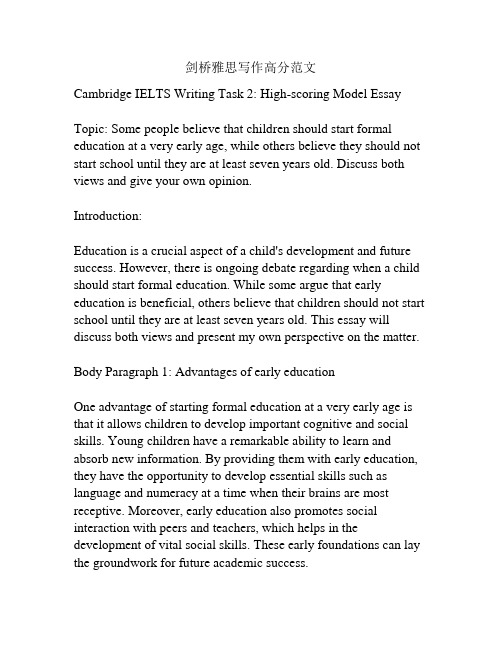
剑桥雅思写作高分范文Cambridge IELTS Writing Task 2: High-scoring Model EssayTopic: Some people believe that children should start formal education at a very early age, while others believe they should not start school until they are at least seven years old. Discuss both views and give your own opinion.Introduction:Education is a crucial aspect of a child's development and future success. However, there is ongoing debate regarding when a child should start formal education. While some argue that early education is beneficial, others believe that children should not start school until they are at least seven years old. This essay will discuss both views and present my own perspective on the matter. Body Paragraph 1: Advantages of early educationOne advantage of starting formal education at a very early age is that it allows children to develop important cognitive and social skills. Young children have a remarkable ability to learn and absorb new information. By providing them with early education, they have the opportunity to develop essential skills such as language and numeracy at a time when their brains are most receptive. Moreover, early education also promotes social interaction with peers and teachers, which helps in the development of vital social skills. These early foundations can lay the groundwork for future academic success.Body Paragraph 2: Disadvantages of early educationOn the other hand, there are some disadvantages to starting formal education at a very early age. Some argue that early academic pressure can lead to stress and anxiety in young children. Childhood is a time for play, exploration, and creativity, and starting school too soon may limit these crucial aspects of a child's development. Additionally, spending long hours in a structured learning environment at a young age might rob children of their freedom and natural curiosity, stifling their creativity and imagination.Body Paragraph 3: Benefits of starting school at least seven years oldThose who advocate for starting school at a later age argue that giving children more time before formal education allows for holistic development. They believe that delaying formal schooling reduces stress levels on children and allows them to develop their physical, emotional, and social skills more naturally. Furthermore, children who have had the opportunity to explore and play freely during their early years may be more curious, independent, and motivated when they enter formal education.Conclusion:In conclusion, there are both advantages and disadvantages to starting formal education at an early age. While early education can promote cognitive and social development, it may also lead to stress and limit the freedom and creativity of young children.Conversely, delaying formal schooling allows for holistic development but might hinder academic progress initially. Personally, I believe that a balance must be struck, taking into account individual children's readiness and providing them with opportunities to learn and develop in a nurturing and supportive environment before formal schooling begins.。
- 1、下载文档前请自行甄别文档内容的完整性,平台不提供额外的编辑、内容补充、找答案等附加服务。
- 2、"仅部分预览"的文档,不可在线预览部分如存在完整性等问题,可反馈申请退款(可完整预览的文档不适用该条件!)。
- 3、如文档侵犯您的权益,请联系客服反馈,我们会尽快为您处理(人工客服工作时间:9:00-18:30)。
剑桥雅思3 Test2 task1 The chart shows that Britain, among the four European countries listed, has spent most heavily on the range of consumer goods included. In every case, British spending is considerably higher than that of other countries; only In the case of tennis racquets does another country, Italy, come close.
In contrast, Germany Is generally the lowest spender. This is most evident in photographic film, where Germany spends much less than Britain. Germany only spends more than another country, France, in two cases: tennis racquets and perfumes.
Meanwhile, France and Italy generally maintain middle positions, averaging approximately similar spending overall. Specifically, France spends more on CDs and photographic film but less on tennis racquets than Italy does. Italy's spending on personal stereos is only marginally greater than that of France, while spending on toys is equal between the two.
It is clear from the data given that there are some significant differences in spending habits within Europe.
TEST 2 TASK 2 Overall, I disagree with the opinion expressed I would like to begin by pointing out that 'traditional skills and ways of life' are not automatically of one country, but of a culture or community.
In many ways, the history of civilization is me history of technology: from the discovery of fire to the invention of the wheel to the development of the Internet, we have been moving on from previous ways of doing things. Some technologies, such as weapons of mass destruction, are of negative impact. Others, such as medical advances, positively help people to live better or longer, and so very much help traditional ways of life. Surely, few people would seek to preserve such traditions as living in caves
Interestingly, technology can positively contribute to the keeping alive of traditional skills and ways of life. For example, the populations of some islands are too small to have normal schools. Rather than breaking up families by sending children to the mainland, education authorities have been able to use the Internet to deliver schooling online. In addition, the Internet, and modern refrigeration techniques, are being used to keep alive the traditional skills of producing salmon; it can now be ordered from, and delivered to, anywhere in the world.
In conclusion, without suggesting that all technology is necessarily good, I think it is by no means pointless', in any way, to try to keep traditions alive with technology. We should not ignore technology, because it can be our friend and support our way of life.
Test3 task1 The data shows the differences between developing and industrialized countries' participation in education and science. In terms of the number of years of schooling received, we see that the length of time people spend at 6chool in industrialized countries was much greater at 8.5 years in 1980, compared to 2.5 years in developing countries. The gap was increased further in 1990 when the figures rose to 10.5 years and 3.5 years respectively.
We can see a similar pattern in the second graph, which shows that the number of people working as scientists and technicians In industrialized countries increased from 55 to 85 per 1,000 people between 1980 and 1990. While the number in developing countries went from 12 to 20.
Finally, the figures for spending on research and development show that industrialized countries more than doubled their spending, from $200bn to $420bn, whereas developing countries actually decreased theirs, from $75bn down to $25bn.
Overall we can see that not only are there very large differences between the two economies but that these gaps are widening.
Test3 task2 The issue of children doing paid work is a complex and sensitive one. It is difficult to say who has the right to judge whether children working is "wrong' or 'valuable'. Opinions will also differ as to 'learning' benefits: no doubt teachers and factory owners, for example, would have varying concerns.
An important consideration is the kind of work undertaken. Young children doing arduous and repetitive tasks on a factory production line, for example, are less likely to be 'learning' than older children helping in an old people's home. There are health and safety issues to be considered as well. It is an unfortunate fact that many employers may prefer to use the services of children simply to save money by paying them loss than adults and it is this type of exploitation that should be discouraged.
